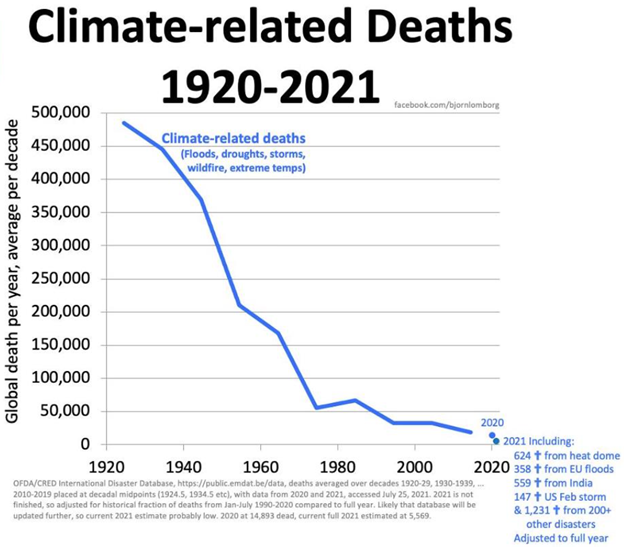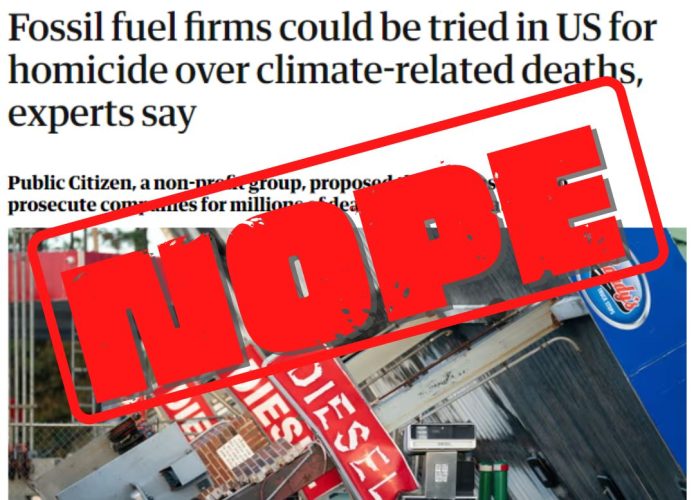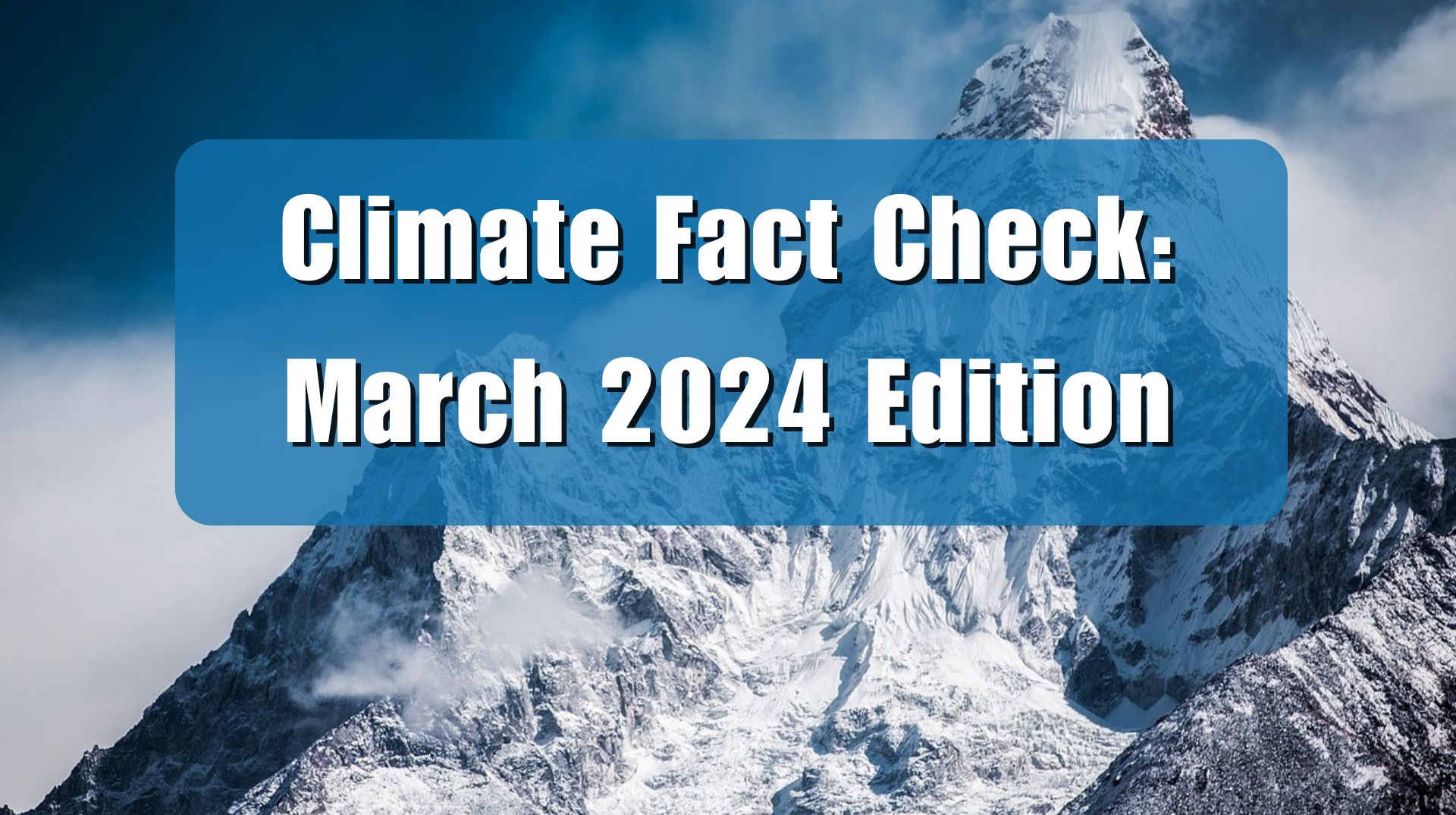A recent Guardian article, “Fossil fuel firms could be tried in US for homicide over climate-related deaths, experts say,” describes a “new legal theory” that claims fossil fuel companies could be tried for homicide based on the claim that fossil fuel use causes climate change and extreme weather resulting in unnecessary deaths. There are several problematic aspects with this so-called legal theory, the primary of which is that the facts don’t support the theory: people are not increasingly dying from climate change. In fact, just the opposite is true, deaths resulting from extreme weather events and temperatures have declined dramatically even as the Earth has slightly warmed.
The Guardian claims that every year “extreme temperatures take 5 million lives, while 400,000 people die from climate-related hunger and disease and scores perish in floods and wildfires.”
It is true that people die from extreme temperatures, hunger and disease, and floods and wildfires, but it is false that these are getting worse. In fact, many fewer people are dying now, since the advent of the use of fossil fuels, than died from those causes before.
Regarding temperatures, in Climate at a Glance: Temperature Related Deaths and many Climate Realism posts on the subject, the vast majority of temperature related deaths come from cold temperatures, not hot, and the warming of the past decades has led to a decrease in the net total number of temperature related deaths because more cold deaths are prevented. The Guardian neglects to mention that of the approximately 5 million temperature related deaths, 4.5 million are related to cold temperatures.
Other climate or weather related deaths, such as those from floods, wildfires, and other storms, have declined dramatically over the same period of time that global warming has occurred. (See figure below)

World hunger and disease has also been reduced over time as crop production hits record highs nearly every year, and technology and medical access is improved in less wealthy countries. Climate change is not making things worse on this front either.
One of the most nonsensical elements of this story is that the proposed lawsuits are trying to go after a negligent homicide charge based on the claim that the fossil fuel industry “hid information about the dangers of fossil fuel use from the public,” and “fought to delay climate action despite knowing about global warming[.]”
This is a claim centered on the “Exxon Knew” misinterpretation of company documents that showed that some employees warned that there could be some warming caused by combustion of fossil fuels, however, other scientists within the company argued that the opposite would happen. The science was not settled when Exxon scientists were debating it and remains unsettled today. There is nothing wrong with internal debate.
The Guardian interviewed Cindy Cho, professor at Indiana University’s Maurer school of law, who admitted that showing “causality between an oil company and any single climate-related death would also likely prove difficult,” and the Guardian went on to say “even if attribution science shows climate change was a factor in increasing the severity of the storm, a court would also have to consider other factors that exacerbated the risk they faced, such as the victim’s underlying health conditions or the strength of their home.”
This is also nonsense, in no small part because attribution science does not prove anything about the influence of climate change on the intensity of storms. Climate attribution studies presuppose that warming had an effect on the storm or event and then try to calculate what percentage of a chance the event would have had of occurring had climate change not been a factor, or how much damage would have been avoided had climate change not made things worse. Climate Realism has debunked attribution science to repeatedly over the misuse of modelling in previous posts here, here, and here, to name a few. Generally, climate attribution is confirmation bias masquerading as scientific inquiry, as the results have not been confirmed by existing data.
To hammer the point home on the hurricane example, real-world data show hurricanes are not getting more extreme or frequent, despite what the attribution scientists have claimed.
In short, contrary to the assertions made by those pushing for oil companies to be tried for climate crimes, deaths from climate and temperature related causes have fallen and continue to decline each year. Where there is no crime, there is no case. Oil companies can’t be blamed for causing worsening weather or more weather-related deaths when trends of neither are increasing. The facts don’t support the claims. The Guardian should expose real harms, rather than promoting shameless shysters’ attempts to cash in a big payday against “big oil” by creating new law that penalizes companies even when they’ve done no identifiable wrong.

















About 4.5 million people die from cold-related causes compared to about 500,000 people dying from heat-related causes each year.
Cold or cool air causes our blood vessels to constrict causing blood pressure to rise and that causes more strokes and heart attacks during the cooler months outside of the tropics worldwide.
‘Global, regional and national burden of mortality associated with nonoptimal ambient temperatures from 2000 to 2019: a three-stage modelling study’
https://www.thelancet.com/journals/lanplh/article/PIIS2542-5196(21)00081-4/fulltext